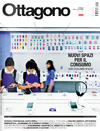Ottagono Magazine features Experientia

In the article “Interaction Design, After Ivrea” Stefano Mirti reflects on the history of the renowned Interaction Design Institute Ivrea and what was born out of it after the school closed. The article, which is published in the November issue of Ottagono, features Experientia as its first case.
You can view it on Issuu.
English text:
“Experientia was already recently spotlighted in Ottagono‘s pages (May, no. 260). But we can’t fail to mention this company founded in Turin by Pierpaolo Perotto, Mark Vanderbeeken, Michele Visciola and Jan-Christoph Zoels, given its uncommon traits. Top quality (and successful) designers put people, their behaviors and their observation thereof at the center of their research. The 35 people in this international group have worked with some of the world’s leading companies. Clients include the likes of Alcatel-Lucent, Asus, Intel, Mozilla, Samsung, SAP, UniCredit, UNStudio (to name just a few) for whom they develop projects on user research, ethnography, interaction design and strategic design. It’s also fascinating to see how their recent undertakings cross design with worlds that are traditionally apart from it, such as healthcare, urban planning, financial services, and mobility. Design is taken to mean innovation in products, services, and processes, putting people and users at the center of focus. Experientia shows how, in order to design, we must understand how people really live. Today and in the future. This leads to five action areas: vision/ understanding/ design/ prototyping/ testing. In Italy this is an uncommon thing.
www.experientia.com
Highlighted projects:
- Engaging, intuitive and self-learning user interface prototypes for Alcatel-Lucent‘s high definition 2D and 3D Online TVs. Services and content offerings are easy to access, and the systems are goal-oriented rather than function-oriented.
- A project for Intel analyzes tablets as innovation opportunities in the healthcare system. The screenshot highlights user interfaces that support doctor workflows and patient engagement.
- The De-Ga building dashboard is an innovative energy demand management system for a new, low-carbon-footprint real estate development in Turin, Italy. Users have quick access to relevant information concerning alerts and notifications, sustainable service availability, and the local community of residents.



